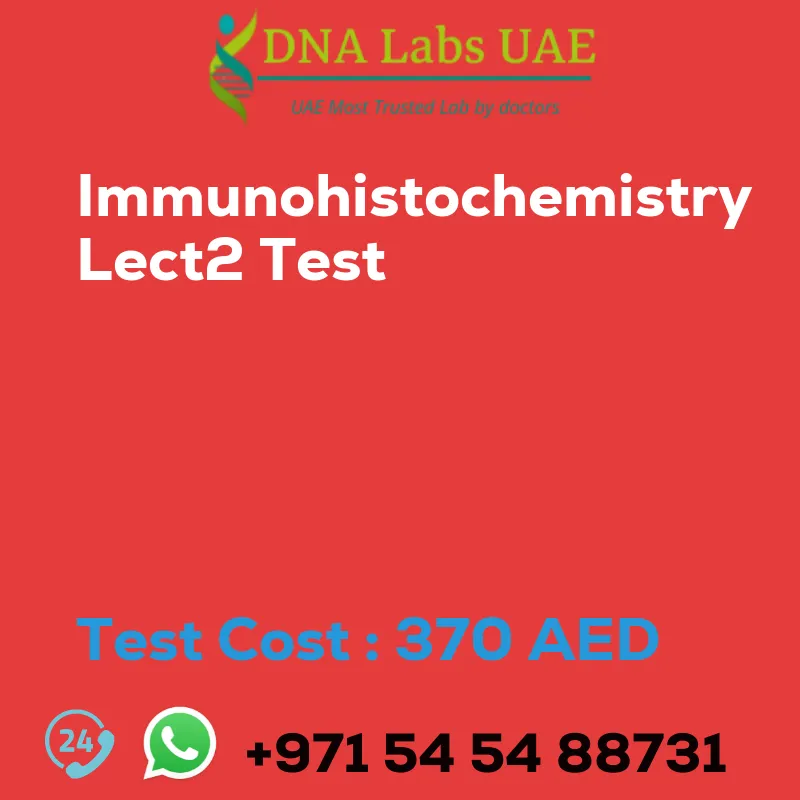IMMUNOHISTOCHEMISTRY LECT2 Test – DNA Labs UAE
Test Cost: AED 370.0
Symptoms, Diagnosis, and Referring Details:
Test Name: IMMUNOHISTOCHEMISTRY LECT2 Test
Components: Immunohistochemistry
Price: 370.0 AED
Sample Condition: Submit tumor tissue in 10% Formal-saline OR Formalin fixed paraffin embedded block. Ship at room temperature. Provide a copy of the Histopathology report, Site of biopsy and Clinical history.
Report Delivery:
- Sample: Daily by 6 pm
- Report Block: 5 days
- Tissue Biopsy: 5 days
- Tissue large complex: 7 days
Test Type: Amyloidosis
Doctor: Nephrologist, Physician
Test Department: HISTOLOGY
Pre Test Information: Provide a copy of the Histopathology report, Site of biopsy and Clinical history.
Test Details:
-
What is immunohistochemistry?
Immunohistochemistry is a technique used to visualize specific proteins or antigens within tissue sections. It involves the use of antibodies that bind to the target protein, followed by the detection of the bound antibody using a secondary antibody conjugated to a visible marker, such as a fluorescent dye or an enzyme.
-
What are the steps involved in immunohistochemistry?
The steps involved in immunohistochemistry include:
- Tissue fixation
- Antigen retrieval
- Blocking
- Primary antibody incubation
- Secondary antibody incubation
- Detection
Tissue fixation preserves the tissue structure and prevents protein degradation. Antigen retrieval involves the use of heat or enzymes to expose the target protein for antibody binding. Blocking is performed to prevent non-specific binding of antibodies. Primary antibody incubation involves the addition of the primary antibody that specifically binds to the target protein. Secondary antibody incubation involves the addition of a secondary antibody that recognizes the primary antibody and is conjugated to a visible marker. Detection is performed to visualize the bound antibodies.
-
What are the advantages of immunohistochemistry?
Immunohistochemistry allows for the visualization and localization of specific proteins within tissue sections, providing valuable information about their distribution and expression patterns. It can be used to study protein expression in normal and diseased tissues, aiding in the diagnosis and classification of diseases. Immunohistochemistry can also be used to determine the cellular localization of proteins, providing insights into their function.
-
What are the limitations of immunohistochemistry?
Immunohistochemistry has some limitations:
- Availability of specific antibodies
- False-positive or false-negative results
- Time-consuming technique
- Skilled personnel required for interpretation
- Cannot provide information about protein function or activity
-
How is immunohistochemistry used in research and clinical practice?
In research, immunohistochemistry is used to study protein expression patterns, investigate disease mechanisms, and evaluate the effectiveness of therapeutic interventions. It is commonly used in cancer research to identify specific tumor markers and assess tumor progression. In clinical practice, immunohistochemistry is used for diagnostic purposes, such as distinguishing between different types of tumors or determining the origin of metastatic cancer. It can also be used to guide treatment decisions by identifying the presence or absence of specific therapeutic targets.
| Test Name | IMMUNOHISTOCHEMISTRY LECT2 Test |
|---|---|
| Components | |
| Price | 370.0 AED |
| Sample Condition | Submit tumor tissue in 10% Formal-saline OR Formalin fixed paraffin embedded block. Ship at room temperature. Provide a copy of the Histopathology report, Site of biopsy and Clinical history. |
| Report Delivery | Sample Daily by 6 pm; Report Block: 5 days Tissue Biopsy: 5 days Tissue large complex : 7 days |
| Method | Immunohistochemistry |
| Test type | Amyloidosis |
| Doctor | Nephrologist, Physician |
| Test Department: | HISTOLOGY |
| Pre Test Information | Provide a copy of the Histopathology report, Site of biopsy and Clinical history. |
| Test Details |
1. What is immunohistochemistry? Immunohistochemistry is a technique used to visualize specific proteins or antigens within tissue sections. It involves the use of antibodies that bind to the target protein, followed by the detection of the bound antibody using a secondary antibody conjugated to a visible marker, such as a fluorescent dye or an enzyme. 2. What are the steps involved in immunohistochemistry? The steps involved in immunohistochemistry include tissue fixation, antigen retrieval, blocking, primary antibody incubation, secondary antibody incubation, and detection. Tissue fixation preserves the tissue structure and prevents protein degradation. Antigen retrieval involves the use of heat or enzymes to expose the target protein for antibody binding. Blocking is performed to prevent non-specific binding of antibodies. Primary antibody incubation involves the addition of the primary antibody that specifically binds to the target protein. Secondary antibody incubation involves the addition of a secondary antibody that recognizes the primary antibody and is conjugated to a visible marker. Detection is performed to visualize the bound antibodies. 3. What are the advantages of immunohistochemistry? Immunohistochemistry allows for the visualization and localization of specific proteins within tissue sections, providing valuable information about their distribution and expression patterns. It can be used to study protein expression in normal and diseased tissues, aiding in the diagnosis and classification of diseases. Immunohistochemistry can also be used to determine the cellular localization of proteins, providing insights into their function. 4. What are the limitations of immunohistochemistry? Immunohistochemistry has some limitations. It requires the availability of specific antibodies that recognize the target protein, which may not always be commercially available. False-positive or false-negative results can occur due to non-specific binding or low antibody specificity. The technique is also time-consuming and requires skilled personnel for interpretation. Additionally, immunohistochemistry cannot provide information about protein function or activity, as it only detects protein expression. 5. How is immunohistochemistry used in research and clinical practice? In research, immunohistochemistry is used to study protein expression patterns, investigate disease mechanisms, and evaluate the effectiveness of therapeutic interventions. It is commonly used in cancer research to identify specific tumor markers and assess tumor progression. In clinical practice, immunohistochemistry is used for diagnostic purposes, such as distinguishing between different types of tumors or determining the origin of metastatic cancer. It can also be used to guide treatment decisions by identifying the presence or absence of specific therapeutic targets. |






